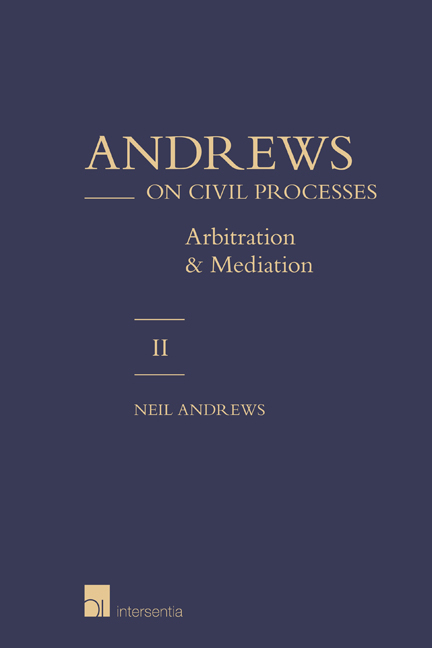Book contents
- Frontmatter
- Dedication
- CONTENTS VOLUME I
- Contents
- Table of Cases
- Table of Statutes
- Table of Statutory Instruments
- PART I MEDIATION
- PART II ARBITRATION
- Chapter 3 Commercial Arbitration: What Is It and Why Choose It?
- Chapter 4 The Major Principles of Arbitration and Litigation: A Comparison
- Chapter 5 Fundamental Features of English Arbitration
- Chapter 6 ‘The Seat’ and the Range of Relevant Laws
- Chapter 7 ‘Arbitrability’: Public Policy Limitations upon the Scope of Arbitration
- Chapter 8 A Confidential Process
- Chapter 9 Arbitration Agreements
- Chapter 10 Courts Giving Effect to Arbitration Agreements
- Chapter 11 Commencement of the Submission and Time Issues
- Chapter 12 The Tribunal's Appointment, Tenure and Immunity
- Chapter 13 Pre-Hearing Proceedings
- Chapter 14 The Hearing
- Chapter 15 Final Remedies, the Award, and Correction of the Award by the Tribunal
- Chapter 16 Fees, Expenses and Recoverable Costs
- Chapter 17 Arbitration Awards: Issues of Finality and Res Judicata
- Chapter 18 Challenges to English Arbitral Awards under English Law
- Chapter 19 English Enforcement of English Awards
- Chapter 20 Enforcement under the New York Convention (1958)
- PART III CONSUMER ADR
- Select Bibliography
- Index to Volumes I and II
Chapter 15 - Final Remedies, the Award, and Correction of the Award by the Tribunal
from PART II - ARBITRATION
Published online by Cambridge University Press: 13 December 2017
- Frontmatter
- Dedication
- CONTENTS VOLUME I
- Contents
- Table of Cases
- Table of Statutes
- Table of Statutory Instruments
- PART I MEDIATION
- PART II ARBITRATION
- Chapter 3 Commercial Arbitration: What Is It and Why Choose It?
- Chapter 4 The Major Principles of Arbitration and Litigation: A Comparison
- Chapter 5 Fundamental Features of English Arbitration
- Chapter 6 ‘The Seat’ and the Range of Relevant Laws
- Chapter 7 ‘Arbitrability’: Public Policy Limitations upon the Scope of Arbitration
- Chapter 8 A Confidential Process
- Chapter 9 Arbitration Agreements
- Chapter 10 Courts Giving Effect to Arbitration Agreements
- Chapter 11 Commencement of the Submission and Time Issues
- Chapter 12 The Tribunal's Appointment, Tenure and Immunity
- Chapter 13 Pre-Hearing Proceedings
- Chapter 14 The Hearing
- Chapter 15 Final Remedies, the Award, and Correction of the Award by the Tribunal
- Chapter 16 Fees, Expenses and Recoverable Costs
- Chapter 17 Arbitration Awards: Issues of Finality and Res Judicata
- Chapter 18 Challenges to English Arbitral Awards under English Law
- Chapter 19 English Enforcement of English Awards
- Chapter 20 Enforcement under the New York Convention (1958)
- PART III CONSUMER ADR
- Select Bibliography
- Index to Volumes I and II
Summary
REMEDIES AVAILABLE TO THE ARBITRAL TRIBUNAL
The parties can agree on the remedies that can be granted.
It might be assumed that this means that they can draw from the portfolio of remedies available under English law, if that is the law governing the substance, or from the range of remedies recognised under any relevant foreign applicable law. But the Departmental Advisory Committee's Report (1996) suggested that party autonomy could have a larger creative function in this context: ‘there is nothing to restrict such remedies to those available at Court’. This comment by the Committee is curiously tantalising and opaque. Indeed it is an irresponsible throw-away line, because the arbitral tribunal is offered no guidance in determining which ‘new’ remedies are acceptable, and which are beyond the pale of English and foreign acceptance.
A more orthodox exercise of party autonomy will be an agreement to exclude a particular type of remedy.
Under the English legislation the arbitral tribunal can grant monetary relief in any currency, including interest (which can be compound). Interest can be awarded in respect of the principal sum(s) mentioned in the award, or the sum(s) claimed and which were only paid after commencement of the proceedings; post-award interest can also be awarded, and this can be compound.
In the Lesotho case (2005) (see also on that case, 18.46 ff) the House of Lords held that the power to make awards of interest is unconstrained. Lord Phillips noted that the phrase ‘as it considers meets the justice of the case’ confers a broad discretion.
But what if the parties’ agreement contains an express exclusion of the power to award compound interest and yet the arbitral tribunal goes on to make an award of compound interest? This would involve an error by the tribunal, because section 49(2) states that the default discretion to award compound interest can be excluded by the parties’ (written) agreement.
- Type
- Chapter
- Information
- Andrews on Civil ProcessesArbitration and Mediation, pp. 301 - 312Publisher: IntersentiaPrint publication year: 2013



